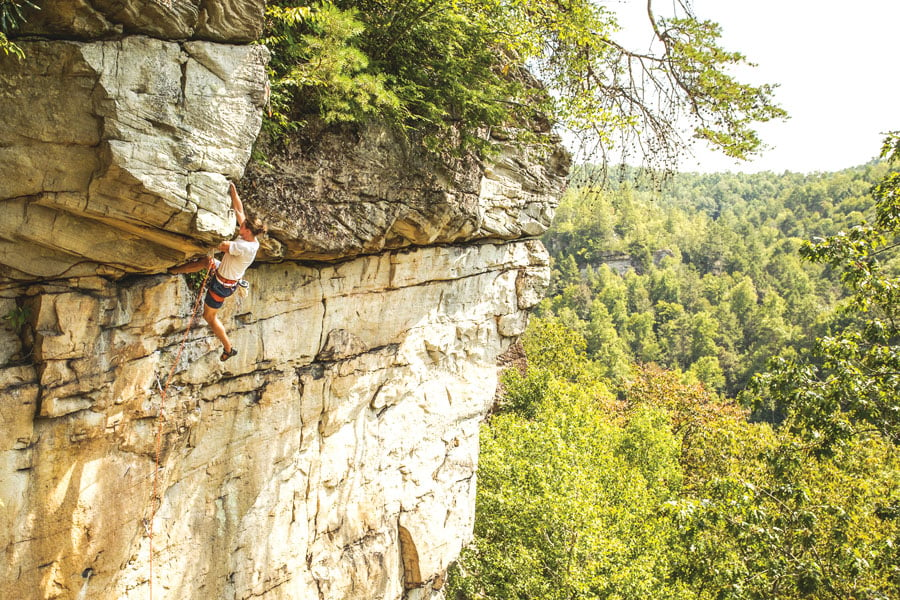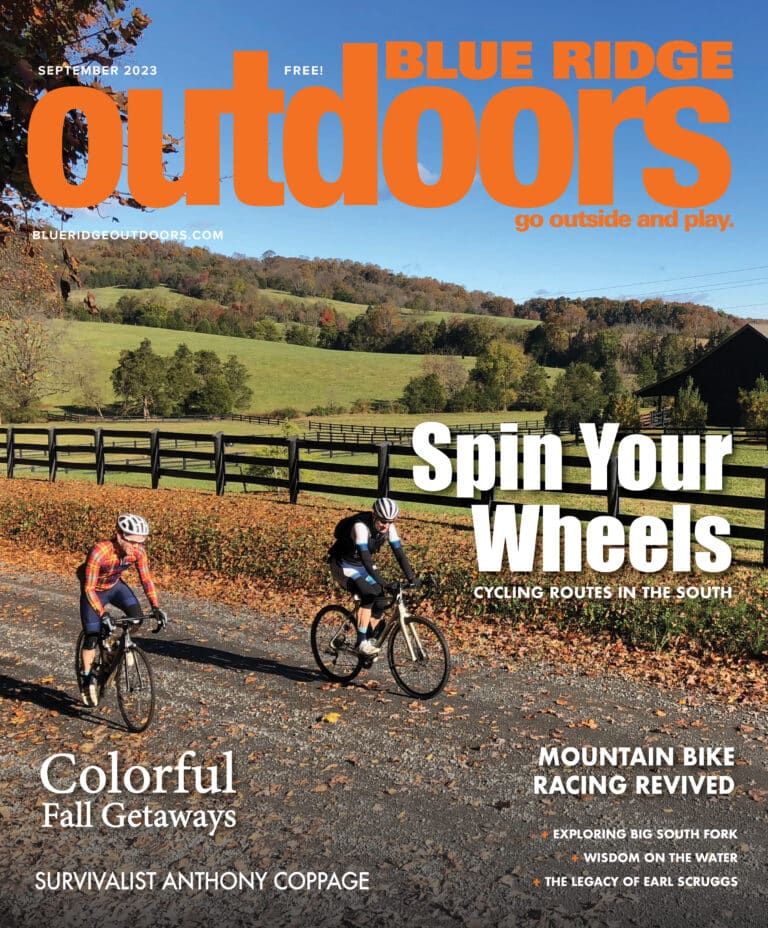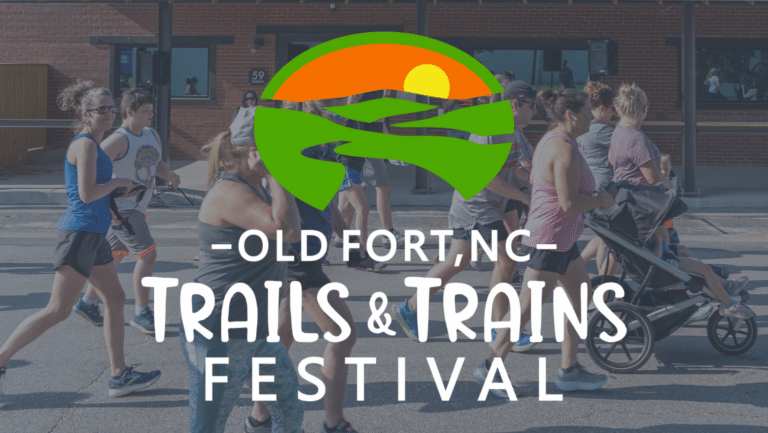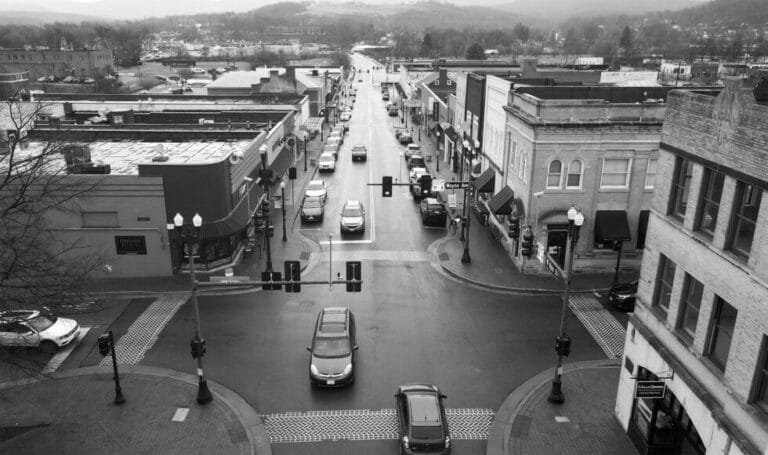As small-town-Appalachia struggles to find a new identity, these four small towns are looking to outdoor recreation for the answer.
Norton, Virginia
Established: 1894
Population: 3,958
I meet Shayne Fields at the Sugar Maple trailhead in Flag Rock Recreation Area. Save for Fields’ red Ford Explorer, the parking lot is empty. He shakes my hand, cracks a corny joke. Instantly, I feel like I’ve known him my whole life. That’s the way it is in southwest Virginia. Hospitality is more than just a dogma of Appalachia—it’s bred into the very marrow.
Fields is trail coordinator for Norton, and he has big plans: among the 30+ miles of singletrack he intends to build, there will be a pump track and an intermediate skills course, gravity trails and rock features.
Situated in the westernmost part of Virginia in Wise County, it’s hard not to see the city’s potential as a recreation destination. Above Norton sits Flag Rock Recreation Area, a 1,000-acre parcel of municipal land. Higher still above the city is High Knob Recreation Area, home to a fire tower and impressive boulderfield littered with stunning highball boulders begging for first ascents. Just 15 minutes out of Norton is the Guest River Gorge, yet another bouldering, climbing, and paddling gem that, with the exception of Fields and a handful of area climbers, has largely gone untouched.
“Norton’s had the idea [to support outdoor recreation] since the early ‘90s I think, but sometimes you need an instrument to point in the right direction,” Fields says.
For better or for worse, that instrument became not so much a person as it did an event—the decline of coal. Driving around Norton, it’s impossible to miss signs of the city’s once-lucrative industry. US-58 passes beneath a now-defunct coal conveyor belt before entering city limits. Gargantuan coal haulers idle in parking lots. The coal tipple along the Guest is quiet. This area once hauled close to one million annual tons of coal from the hills and hollers of Appalachia.
“It was like the money was flowing out of everywhere,” Fields, now 52, says. “This area felt like a boom town.”
And it was. But when Fields returned to his hometown back in 2003, coal was on its way out and the city’s residents were left reeling in its wake and asking—what next?
Fields, a longtime climber and active member of the local Lonesome Pine Cycling Club, wasn’t sure he had the answer, but he knew if there was one thing besides coal that Norton had an abundance of, it was recreation.
“Normally you go before a city with a proposal and all they have are worries and concerns, but [Norton’s] perspective is always, ‘How can we make this work?’ There’s this community understanding that if we want to survive, if we want to grow, it’s gotta come from us.”
That’s Brad Mathiesen, a 28-year old transplant to Wise County and the Director of Campus Ministry at UVA-Wise. Mathiesen is also the co-founder of the Southwest Virginia Climbers Coalition and, like Fields, he knows Norton has what it takes to become the next best adventure destination. In the two years Mathiesen has lived in Norton, he’s put up close to 100 new routes between Flag Rock and the Guest, and he says that’s hardly scratching the surface of the area’s potential.
Still, there’s no denying that Norton has a long way to come before hipster climbers overrun the city. For starters, says Mathiesen, the city needs jobs that would appeal to recent college graduates and replace at least some of the void left by the coal mines. Toss in a few more restaurants, maybe a coffee shop with some WiFi, and Norton could really shine—the highway and hospitality infrastructure is already a mainstay here.
“I think the town is really starting to recognize and say, ‘Hey, let’s embrace this [outdoor] identity. It’s not something we have to work for or pay for. It’s something that’s been given to us, so instead of ignoring it, let’s try to build our city around it.’”
In addition to completing Fields’ trail network in Flag Rock Recreation Area, the city is currently working on plans for a Norton Riverwalk, a two-mile multi-use path that would connect downtown Norton with the community of Ramsey and clean up an abandoned coal tipple along the Guest. Mathiesen is also collaborating with the city to develop an officially sanctioned bouldering field on High Knob.
How to play: Hike the High Knob fire tower for 360-degree views of the Jefferson National Forest with the newly established High Knob Outdoor Club. Cruise the trails at Flag Rock Recreation Area by bike or foot. Explore the class IV-V Guest River Gorge by boat or stay high and dry on the Guest River Gorge Trail.
Where to stay: Journey’s End at Camp Bethel for a bed and breakfast experience (rates vary). Pitch a tent closer to town at Flag Rock Recreation Area for $20 per night.
When to go: Summer for the hiking (High Knob is always 10 degrees cooler than Norton), fall for the climbing.
Spencer, West Virginia
Established: 1858
Population: 2,248
High above Spencer sits a placard with a black and white image of the town from the 1900s. Today, there’s a Wal-Mart and a bridge that crosses Spring Creek, but in general, 2016 Spencer looks pretty much exactly like its 1900s version.
“It’s downhome, country charm, Spencer, Mayberry, USA. After 63 years, it’s still a pleasure and a lot of fun to live here,” says Spencer-born-and-raised Jeff Fetty.
In the early ‘90s, mountain biking took off in West Virginia. Fetty, who raced throughout the state, knew that Spencer was prime for the picking—situated an hour north of Charleston, the city had 3,000 acres of undeveloped land, undulating terrain, and most importantly, the support of the local government. So, with a number of volunteers, Fetty helped create the trails at Charles Fork Lake. In ’94, he organized the city’s first mountain bike race, the Tour de Lake, at which 103 racers showed up. The next year, exactly 206 racers competed. The word was out. Spencer was on the map.
“The groundwork that we laid 25 years ago, it’s really starting to pay off,” says Fetty.
Last year, Friends of Charles Fork Lake Vice President Philip Smith received a $40,000 grant from the West Virginia Department of Highways to build the trails at Ben’s Run. Smith, whose family has lived in Roane County for six generations, is Spencer’s biggest advocate, especially when it comes to expanding outdoor recreation in town.
“One of the reasons that most people don’t think of Roane County or Spencer when they think about public lands is because we don’t have a state forest, we don’t have a state park, we don’t have a national park,” he says. “Most people don’t really think about municipal properties, but out of this entire state, I would challenge you to find a city, especially a city the size of Spencer that has better municipal lands.”
It’s this, says Cycle-Smart Coach Jacob Fetty, Jeff Fetty’s son and a native of Spencer, that should make the city flourish. After years of traveling around the world, Jacob moved back to Spencer upon retiring from a full-time career in road and mountain bike racing.
“Spencer is unique in that the municipality owns thousands of acres of land and by such controls its own destiny,” he says.
When you couple that city land with low property taxes and cheap rent, you have what Smith says ought to be the next Fayetteville. “In Spencer, most businesses here are small businesses, and by small I mean micro-small, less than 10 employees,” Smith says. “People have been really resilient and tried to figure out how to create income for themselves.”
Smith and the Fettys agree that fostering the continued growth of recreation tourism could be, at the very least, a part of the economic puzzle for Spencer. The challenge, says Smith, will be pulling in new out-of-towners. Winding two-lane roads lead to Spencer. With the exception of a small section of I-79 at the southern edge of Roane County, there are no four-lane highways here.
“I think the town has a lot of potential for tourism,” Jeff Fetty says. “We’re not going to get another hub cap manufacturing company or sweater factory. But if you have someone come into your community to kayak or ride the trails, the dollar that they spend turns around seven times before it leaves.”
The Tour de Lake now serves as the opening race in the West Virginia Mountain Bike Association point series. This past September, the city hosted its first trail race, the Charlie’s Challenge 5K/25K/50K. Be on the lookout for more races like these as well as the completion of the Spencer disc golf course in the months to come.
How to play: Ride the 10.1-mile race loop at Charles Fork Lake. Be on the lookout for such highlights as the Mystery Mailbox. Paddle and camp on the lake itself—backcountry camping here is free. Ride or run at Ben’s Run before grabbing a glass (or bottle) of wine at Chestnut Ridge.
Where to stay: The Arnott House Bed and Breakfast provides a quirky look back in time thanks to the ever-entertaining hostess Dilya (rates from $79 per night). Camp at the base of Charles Fork Lake on electric hookup sites starting at $14 per night.
When to go: Spring for the riding, fall for the foliage (and of course, the West Virginia Black Walnut Festival).
Dahlonega, Georgia
Established: 1833
Population: 6,049
The history of Dahlonega is rich. Visitors to the quaint north Georgia town need only scan the horizon to see signs of Dahlonega’s storied gold mining past—high atop the University of North Georgia’s campus sits the iconic Price Memorial Hall steeple, covered in Dahlonega gold. The largest gold deposits east of the Mississippi River were found here, a discovery made 20 years before miners even thought about rushing off to California.
Yet what fueled a surge in population and development some two centuries ago has largely kept the look and feel of present-day Dahlonega unchanged. The quiet beauty and natural splendor of Dahlonega are inspiring a new wave of out-of-towners to tap into the “new gold” of north Georgia—the great outdoors.
“Dahlonega is still on the list of what’s vanishing in America,” says Appalachian Outfitters owner Ben LaChance. “You still have mom-and-pop restaurants. Just 15 minutes from my house I can be hiking the A.T. or paddling on our beautiful little reservoir.”
For LaChance, that juxtaposition between small town living and boundless recreation is exactly the reason he moved to Dahlonega over 30 years ago. His outfitter, which offers guided trips on Yahoola Creek and the Chestatee and Etowah Rivers, has grown alongside the town. Business, he says, is better than ever, but what of the future?
“The people that stay here and tend to own property are usually more [in their] 40s to mid-60s,” he says,” but so many college students have four years in Dahlonega and they’re all around recreating, biking, running through town, coming into the restaurants.”
That young energy has certainly paid off—there’s a vibrant arts community, a dynamic live music scene, and the best wine tasting in the state of Georgia. But with a tax exemption provided for Dahlonega residents 65 and older, it should come as no surprise that the majority of those who settle in town are retirees.
“Right now there are as many students at the university as there are in the community of Dahlonega,” says Tourism Director David Zunker. “The university is producing students who want to stay and we have to find opportunities for them.”
The potential is there. Now, more than ever, young professionals are working remotely, creating their own businesses, and freelancing. Just an hour north of Atlanta and within minutes of the Appalachian Trail’s southern terminus, Dahlonega couldn’t be better positioned not only to attract tourists but to also cater to its residents who might need to hop on a plane for business. The town, says Zunker, recognizes this evolving concept of the workplace and has plans to improve its technology infrastructure in the years to come.
“We want to continue to evolve as a tourist destination but also as a place that welcomes new millennials.”
How to play: Float the Etowah, hike to Amicalola Falls, then round out an evening listening to music at The Crimson Moon.
Where to stay: The Smith House (rooms starting at $99/night) is charming, historical, and conveniently located just one block from downtown Dahlonega. There’s even an original gold mining shaft visitors can view in the basement of the house. You can also rough it at the Foothills Campground for $25 per night.
When to go: Spring for the waterfalls, summer for the paddling and the annual Dahlonega Trail Fest.
Eden, North Carolina
Established: 1967
Population: 15,488
Known mostly as a tobacco, and later cotton and textile, hub, Eden has long boasted fertile land, rolling hills, and clean water at the confluence of two rivers. It’s no wonder William Byrd II, upon establishing a home here in the early 1700s, deemed it “The Land of Eden.”
But in the past few years, a number of major employers, including Miller Coors, have closed their doors. Combined with the negative attention that stemmed from a recent coal ash spill, the question of how to redefine Eden’s identity has elbowed its way to the forefront of minds like Mike Dougherty, City of Eden Economic Developer.
“Your natural resources, that’s what you have that differentiates you from everyone else,” Dougherty says. “In Rockingham County, we have four rivers, two state parks, and two lakes. We really should be the mecca of outdoor recreation in this area.”
Within the next decade, Dougherty is hopeful that Eden will come into its own as a literal outdoor lover’s paradise—there’s already a planned expansion of the Smith River Greenway as well as in-town trail projects and boat launches in the works. The nearby Dan River crisscrosses the border eight different times.
“Lots of folks enjoyed the river when I was growing up, but there weren’t as many recreational opportunities on the river because there weren’t public accesses,” says Three Rivers Outfitters co-owner Mark Bishopric. “As the public accesses have increased, we’ve seen significantly more activity in terms of canoeing, kayaking, paddleboarding, and tubing.”
Bishopric grew up in Eden and worked for the textile industry as a young adult. In 2004, he joined two other locals to start Eden’s first outfitter. At first, business was slow but the team saw an inherent need in the community to provide a means of experiencing “The Land of Two Rivers,” and so, they persevered. Now, on any given year, Three Rivers Outfitters can have as many as 1,500 people on the water, the majority of whom are visiting from Raleigh, Greensboro, or Danville.
“It’s a stick-with-it-and-grow-over-time type of business,” Bishopric says. “That’s what it takes. For each new trail you put in or each new water access or amenity, it’s just another piece of the puzzle and that just has to grow slowly over time.”
The momentum is definitely building. Thanks in part to the creation of the Dan River Basin Association in 2002, the watershed that has for so long powered not just industries but the homes of some 1.5 million citizens is getting its due attention. The association hopes to bring together the 16 counties within the Dan River basin to further promote and protect this precious resource in the years to come.
“We have a long way to go, but we’re a resilient bunch here,” says Dougherty. “The best is ahead of us.”
How to play: Paddle and fish on the Dan River, ride the Smith River Greenway, pack a picnic for Freedom Park, and grab a glass of wine at Autumn Creek Vineyards.
Where to stay: Pitch a tent at Dan River Campground starting at $25 per night for primitive sites. These guys can also hook you up with rentals should you decide to float the Dan during your stay.
When to go: Summer for the festivals. Our favorites are the annual Charlie Poole Music Festival and River Fest.








